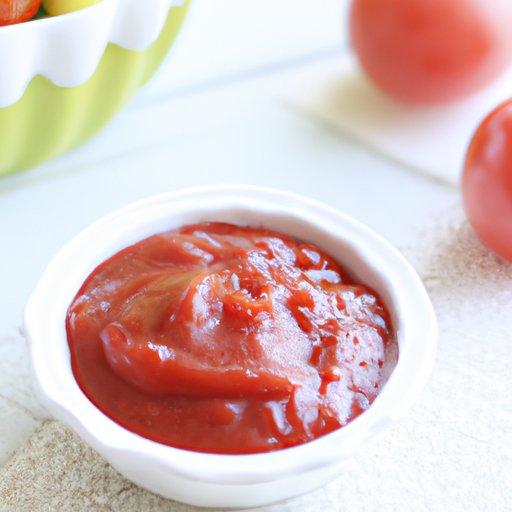Introduction
Tomato sauce is a staple in many households around the world. It’s used to add flavor and texture to dishes, from pizza and pasta to soups and stews. But is tomato sauce healthy? This article will explore the nutritional benefits of tomato sauce, as well as look at healthier alternatives and the impact of artificial additives on health.
Nutritional Benefits of Tomato Sauce
Tomatoes are a nutrient-rich food, so it makes sense that tomato sauce would have similar benefits. Tomatoes are an excellent source of vitamins A, C, and K, as well as several minerals such as potassium and magnesium. Tomatoes also contain lycopene, an antioxidant which has been linked to a reduced risk of certain cancers, heart disease, and age-related macular degeneration.
Tomato sauce is typically made with tomatoes, onions, garlic, herbs, and spices. These ingredients contribute additional nutrients such as fiber, vitamin B6, folate, and iron. Depending on the recipe, tomato sauce can also provide some protein.

Exploring Healthier Alternatives to Traditional Tomato Sauces
Traditional tomato sauces can be high in sodium, added sugars, and fat. To make a healthier version, consider using fresh tomatoes instead of canned. Fresh tomatoes are naturally lower in sodium, sugar, and fat than their canned counterparts. You can also opt for low-sodium or organic tomato sauces. Many companies now offer these options, which can help you reduce your sodium intake without sacrificing flavor.
Comparing Low Sodium Tomato Sauces
When comparing low-sodium tomato sauces, there are a few key factors to consider. First, check the nutrition label for total calories, fat, carbohydrates, protein, and sodium content. Taste is also important; some brands may use more herbs and spices to compensate for the lack of salt. Finally, cost can be a factor depending on your budget.

Evaluating the Role of Tomato Sauce in a Healthy Diet
For a balanced diet, it’s important to pay attention to macronutrient balance. Tomato sauce can be a great way to add flavor and variety to meals without adding too much fat or calories. However, portion control is key; a single serving size of tomato sauce is usually just ¼ cup. Be sure to measure out appropriate portions to avoid overeating. Additionally, try to incorporate other vegetables into your meals to ensure a balanced diet.
Analyzing the Effects of Tomato Sauce on Blood Pressure and Cholesterol Levels
The sodium content of tomato sauce can have an impact on your blood pressure and cholesterol levels. One study found that people who consumed over 2,000 milligrams of sodium daily had higher systolic blood pressure compared to those who consumed less than 1,500 milligrams daily. The same study also found that higher sodium intake was associated with higher levels of LDL (“bad”) cholesterol.
In addition to sodium, tomato sauce can contain trans fats and added sugars, both of which can have negative impacts on health. Trans fats have been linked to an increased risk of heart disease, while added sugars can lead to weight gain and an increased risk of type 2 diabetes.

Examining the Impact of Artificial Additives in Tomato Sauces
Many store-bought tomato sauces contain artificial additives such as flavor enhancers, preservatives, and colorants. These additives can potentially have negative impacts on health, including an increased risk of cancer. For this reason, it’s important to read labels carefully and opt for sauces with fewer additives.
Conclusion
Tomato sauce can be a nutritious and flavorful addition to meals. However, traditional varieties can be high in sodium, added sugars, and fat. To make healthier choices, look for low-sodium or organic sauces, and use fresh tomatoes when possible. Additionally, be mindful of portion sizes and incorporate other vegetables into your diet for a balanced meal. Finally, read labels carefully to avoid artificial additives. With a few simple changes, you can enjoy the taste of tomato sauce without compromising your health.
(Note: Is this article not meeting your expectations? Do you have knowledge or insights to share? Unlock new opportunities and expand your reach by joining our authors team. Click Registration to join us and share your expertise with our readers.)
